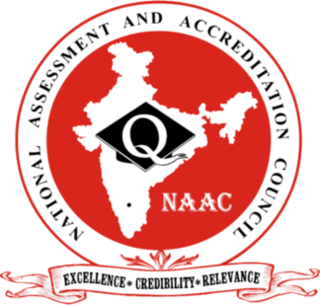In India, a deemed university or deemed-to-be-university is an accreditation granted to higher educational institutions in India by the Ministry of Education. According to the ministry's definition, the accreditation indicates, "an Institution of higher education, other than universities, working at a very high standard in specific area of study" and the accreditation grants "the academic status and privileges of a university."

The Philippine Accrediting Association of Schools, Colleges and Universities (PAASCU) is a private, voluntary, non-profit and non-stock corporation which was registered with the Securities and Exchange Commission of the Philippines. It is a service organization that accredits academic programs which meet commonly accepted standards of quality education.
The Electoral Commission is an independent Crown entity set up by the New Zealand Parliament. It is responsible for the administration of parliamentary elections and referendums, promoting compliance with electoral laws, servicing the work of the Representation Commission, and the provision of advice, reports and public education on electoral matters. The commission also assists electoral agencies of other countries on a reciprocal basis with their electoral events.

University Grants Commission is a statutory body under Department of Higher Education, Ministry of Education, Government of India. It was set up in accordance to the UGC Act 1956 and is charged with coordination, determination and maintenance of standards of higher education in India. It provides recognition to universities in India, and disbursements of funds to such recognized universities and colleges. The headquarters are in New Delhi, and it has six regional centres in Pune, Bhopal, Kolkata, Hyderabad, Guwahati and Bangalore. A proposal to replace it with another new regulatory body called HECI is under consideration by the Government of India. The UGC provides doctoral scholarships to all those who clear JRF in the National Eligibility Test. On an average, each year ₹725 crore (US$91 million) is spent on doctoral and post-doctoral fellowships by the commission.
Accreditation is the independent, third-party evaluation of a conformity assessment body against recognised standards, conveying formal demonstration of its impartiality and competence to carry out specific conformity assessment tasks.

The All India Council for Technical Education (AICTE) is a statutory body, and a national-level council for technical education, under the Department of Higher Education. Established in November 1945 first as an advisory body and later on in 1987 given statutory status by an Act of Parliament, AICTE is responsible for proper planning and coordinated development of the technical education and management education system in India.
The Distance Education Bureau (DEB) is a bureau of the University Grants Commission (UGC) based in New Delhi, India, in charge of regulating distance education in India. It was established in 2012, replacing the Distance Education Council (DEC), an organisation that was responsible for open learning and distance education since 1985.

The National Assessment and Accreditation Council (NAAC) is a government organization in India that assesses and accredits Higher Education Institutions (HEIs). It is an autonomous body funded by the University Grants Commission and headquartered in Bangalore.
The National Universities Commission (NUC) is a government commission for promoting quality higher education in Nigeria. Situated in Abuja, it was established in 1962 as an advisory agency in the cabinet office. In 1974, it became a statutory body and its first executive secretary was professor Jibril Aminu. NUC is currently part of the Federal Ministry of Education and is a parastatal.
The West Virginia Department of Education is the state education agency of West Virginia. It is headquartered in Charleston.
The Pakistan Nursing Council (PNC) (پاکستان نرسنگ کونسل) is a regulatory body established in 1948 by the Pakistan Nursing Council Act (1952, 1973). PNC is empowered to license nurses, midwives, lady health visitors (LHVs) and nursing auxiliaries to practice nursing throughout the country.
Higher education accreditation in the United States is a peer review process by which the validity of degrees and credits awarded by higher education institutions is assured. It is coordinated by accreditation commissions made up of member institutions. It was first undertaken in the late 19th century by cooperating educational institutions, on a regional basis.
Higher education accreditation is a type of quality assurance process under which services and operations of post-secondary educational institutions or programs are evaluated to determine if applicable standards are met. If standards are met, accredited status is granted by the agency.

Pakistan Medical and Dental Council is a statutory regulatory authority that maintains the official register of medical practitioners in Pakistan. Its chief function is to establish uniform minimum standards of basic and higher qualifications in medicine and dentistry throughout Pakistan. It also sets the education standards for medical colleges in Pakistan along with the Higher Education Commission.
Indian National Commission for Cooperation with UNESCO is a governmental body formed by the Government of India which functions under the Department of Secondary and Higher Education in the Ministry of Human Resource Development. The objective of the commission is to advise the Government in matters relating to the UNESCO.
This page is based on this
Wikipedia article Text is available under the
CC BY-SA 4.0 license; additional terms may apply.
Images, videos and audio are available under their respective licenses.




